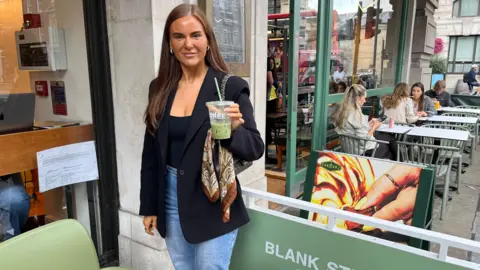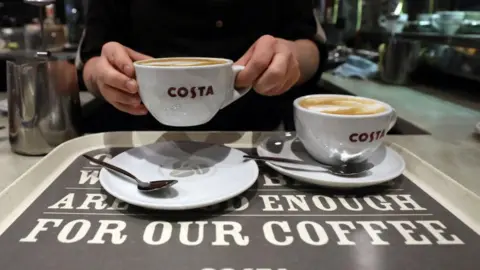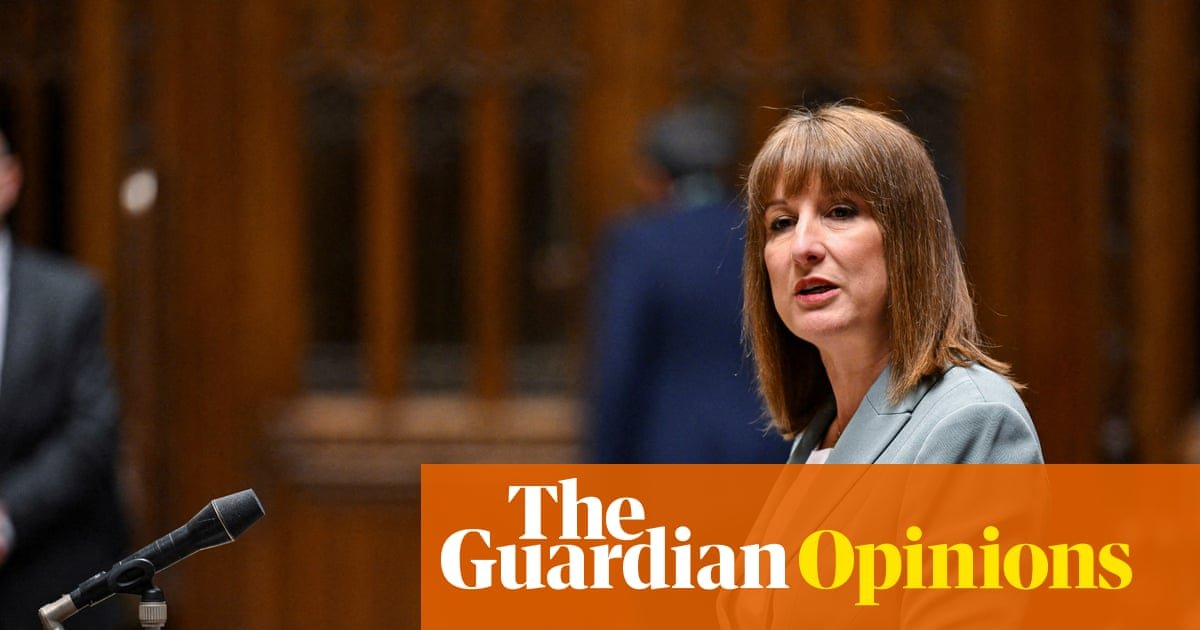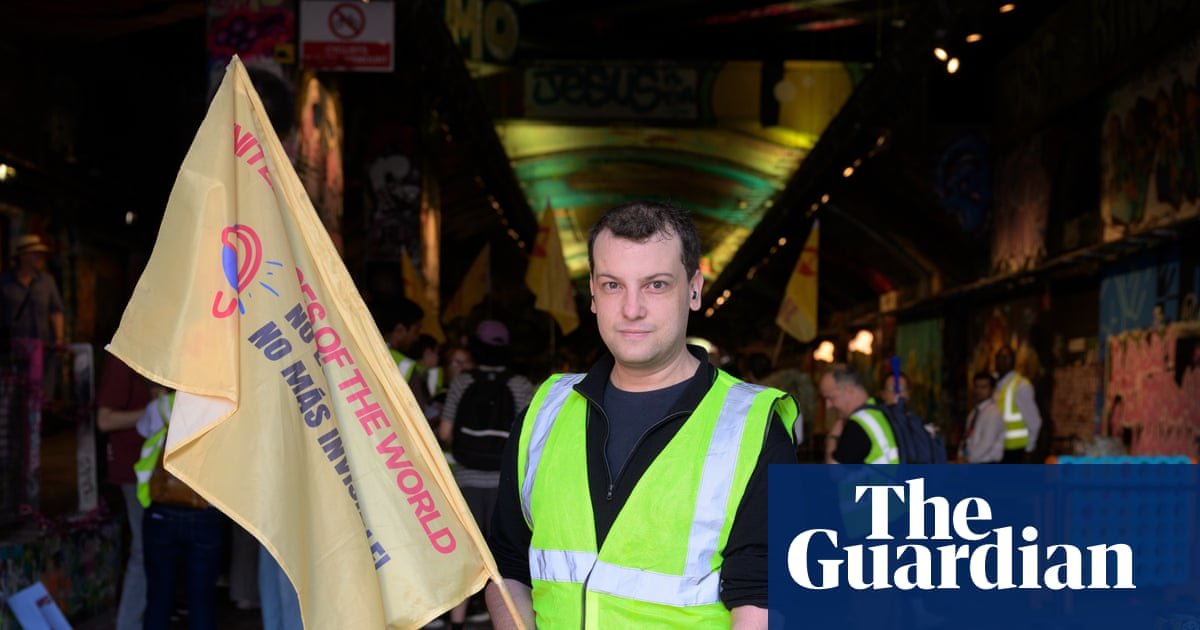Business
How coffee chains like Costa lost the matcha generation

Rachel Clun & Connie BowkerBusiness reporters, BBC News
 BBC
BBCLucy Williams is enjoying an iced strawberry matcha after going with her sister to her niece’s first-ever haircut.
“I feel like a strawberry matcha is a coming out with your sister thing, rather than an everyday thing,” she says.
But you can’t get an iced strawberry matcha – or any kind of matcha at Costa Coffee.
Lucy is at Blank Street Coffee where a rainbow array of matcha drinks have gained the chain a cult following, including celebrity fans Mollie-Mae Hague and Sabrina Carpenter.
Lucy drinks coffee at home every day, but buys a barista-made cup for when she wants a treat.
“There are only certain places I’d go for a coffee,” she says and Costa is not on her list.
Costa’s owner Coca-Cola is reportedly looking to sell the chain, with one analyst suggesting it could go for £2bn – less than half of the £4.9bn it paid in 2019. So is something going wrong?
 The Boston Globe via Getty Images
The Boston Globe via Getty ImagesCoffee and tea drinking trends are changing particularly among younger generations, analysts say, and when combined with higher coffee prices and cost of living pressures in general, chains like Costa are in hot water.
But not Blank Street which began in 2020 as a tiny coffee cart in the garden of a Brooklyn diner before expanding across New York, Washington and Boston. It opened its first London store in 2022 and now has about 35 in the capital with three more in Manchester, two in Birmingham and two in Edinburgh.
Its popularity has in part been driven by its TikTok appeal, with fans posting videos of themselves ordering in its minty fresh decorated cafes or at free tattoo pop up events.

For Australian travellers Bree Taylor and Rebecca Trow, both 27, Blank Street was on their London to-do list after seeing its pastel-hued drinks on TikTok.
“We saw it and were like ‘we have to go there’. We saw it and came here specifically. We wanted to try it,” says Rebecca.
Lauren Nicholson, 24, and Jordan Brookes, 27, were also drawn to the cafe for its brightly coloured matcha which cost just under £5 each.
Jordan says he started drinking matcha about two months ago and is now “hooked”.
He’s not the only one – the worldwide matcha craze means supplies of the bright green Japanese tea are drying up and the demand is pushing up prices.
Costa’s rivals jumped on the trend with Starbucks and Pret offering an iced matcha latte and Nero a strawberry and vanilla iced matcha latte.
And its not just a London thing – viral chains like Gail’s and Black Sheep Coffee with cafes across the UK make it – with the latter offering green matcha waffles too.

Seeking out a new luxury drink as an affordable treat is a trend that emerged since Covid and has continued to grow as the cost of living remains high.
“If you think about a lot of gen Z, they’re looking at matcha, they’re looking at brews, they’re more healthy. My late teenagers, they don’t drink caffeinated beverages at all,” says Danni Hewson, head of financial analysis at AJ Bell.
Traditionally, matcha is considered to contain antioxidants and have a more tempered caffeine effect than the “high” and “crash” of regular coffee but there is some debate over any proven health benefits.
Alongside standard coffees, Costa serves a variety of frappé and fruit coolers, but these contain syrups and can be topped with whipped cream which may not appeal to the clean-living green-juice sippers among us.
With the rising popularity of home coffee machines, chains have to come up with special reasons to get customers through the door.
 Getty Images
Getty ImagesCosta is not the only brand struggling with the changing UK coffee market, says Clive Black, vice chairman of independent investment group Shore Capital.
The rise of smaller chains and artisanal independent stores have also “eaten into the share” of the major chains, he adds.
Young people increasingly care about spending choices – Lauren and Jordan both say they generally avoid big coffee chains in favour of supporting smaller businesses, but also because of considerations about the taste.
And when a coffee can cost you the best part of £5 you expect something you can’t make yourself.
“A straight up latte isn’t a treat, that’s a necessity,” says Clare Bailey, independent retail analyst and founder of The Retail Champion.
“I feel like businesses that don’t reimagine themselves and don’t respond to consumer behaviour, and perhaps get a little complacent, are the ones who end up in trouble,” she adds.
Coca-Cola’s chief executive James Quincey admitted to an investor call last month Costa was “not where we wanted it to be” and the company was “thinking about how we might want to find new avenues to grow in the coffee category”.
Costa began as a London roastery in 1971 and has since expanded to more than 4,000 stores and with operations in 50 countries. It is a prominent feature of many a high street in small towns across the country.
In the 2023 financial year, the most recent report, Costa reported revenues of £1.2bn, but said inflationary pressures including increased prices of goods, energy and pay resulted in an operating loss of £14m.
Now Coca-Cola is working with investment bank Lazard to explore its options for the coffee chain, including a potential sale, according to reports from Reuters and Sky News. Clive, from Shore Capital, says it is not clear why Coca-Cola bought Costa in the first place.
Costa, Coca-Cola and Lazard were all approached for comment.

There are now 11,450 branded coffee chain outlets across the UK, up from 9,800 five years ago, according to World Coffee Portal.
And the number of independent coffee shops has also risen over the last five years from 11,700 to around 12,400 now.
With so much choice, competition to attract customers heats up. Mimoza Emsa, 47, says while she used to drink Costa, she now always goes to Pret because it’s close to her work and she has its subscription which offers discounts.
“It’s really convenient. It’s one of the things that persuades me to have coffee here,” she says.
Costa and similar chains are not as quick and cheap as a Greggs or McDonalds coffee, but also don’t offer the higher-end experience for when we want to treat ourselves.
“We’ve seen all these middle of the road retailers struggle because they’re neither one thing nor the other,” says retail analyst Clare.

Despite these shifts, Costa still has loyal customers.
Rafik Khezmadji, 37, says he comes to Costa because it’s close to work, but he also enjoys being able to sit outside and savour his coffee.
“I enjoy having this moment to myself,” he says.
For 20-year-old fashion business student Megan Penfold the coffee at Costa is “not the worst and not the best”. She has stopped at the cafe on Wigmore Street in London for a quick black coffee.
“Trends don’t affect me as much. I like what I like,” she says.
Business
Rachel Reeves is under immense pressure. She must not waste her chance to ‘go big’ | Heather Stewart

It’s back to school this week for MPs and government ministers – and few can be facing a more challenging new term than Rachel Reeves.
After being moved to tears in the unforgiving glare of the cameras before the summer break, the chancellor’s allies say she is returning to the frontline with a renewed sense of purpose. She is ready, as the kids would say, to “lock in”.
But team Reeves is also well aware of the scale of the economic and political obstacles ahead. Most pressing, yet out of the chancellor’s hands, is the Office for Budget Responsibility’s (OBR) summer “supply stocktake” of its economic model.
As we reported in June, this looks likely to see the OBR move its key productivity forecast closer to the less-positive consensus. Given the crucial importance of productivity in determining economic growth, this shift could create a £20bn headache for the Treasury.
The downgrade – not anything Labour has actually done – is likely to be the biggest factor pushing Reeves off track from her fiscal rules.
That creates a formidable challenge in explaining what has gone awry – and why she needs to come back with more tax increases, after last year’s historic £40bn budget package.
Expect to hear much more of the kind of language Reeves used in her recent Guardian article, in which she argued that “if renewal is our mission and productivity is our challenge, then investment and reform are our tools”.
She does have a story to tell here: changing the fiscal rules to prioritise investment has allowed the Treasury to give the green light to scores of pro-productivity infrastructure projects (with the next expected to be Northern Powerhouse Rail).
In the same vein, expect tax rises to be badged as efficiency-enhancing, as well as revenue raising.
Officials do not yet know the scale of the fiscal gap they will need to fill – though they expect it to be large. Reeves’s decision to involve Torsten Bell, formally the pensions minister, in budget preparations, points to a willingness to think more radically.
Bell has argued in the past for changes to the taxation of unearned income, property wealth – which we know the Treasury are looking at closely – and pensions.
Reeves made moves in this direction last autumn, with changes to inheritance and capital gains taxes; but this budget must be the moment to “go big,” as Bell’s former boss Ed Miliband would put it. (Arguably, the moment was, in fact, last July, but here we are.)
Yet as she draws up her plans, Reeves must have her eye on at least three different audiences, each in their way as tough as the meanest girls in the dining hall.
The first, and most important, is the public, for whom the chancellor may be best known as the author of last year’s botched removal of the winter fuel allowance.
While she is claiming to have been “fixing the foundations” in her first year in the job, it may not feel like it for families facing resurgent inflation – which hits low earners hardest.
And unfortunately, “Labour crashed the economy”, while unfair, is a much cleaner explanation for fresh tax rises than, “the OBR has systemically overestimated productivity, which hasn’t recovered since the financial crisis”.
Reeves will need to convince cash-strapped voters she understands their struggles and has a plan to help.
after newsletter promotion
Also watching Reeves closely will be those behind her, in her own party. Once seen as a potential future leader, she is blamed by some Labour MPs for a series of dire missteps, including on winter fuel and the botched spring statement welfare cuts.
Keir Starmer’s decision to bring in the former Bank of England deputy governor Minouche Shafik as his economic adviser, and the senior Treasury civil servant Dan York-Smith as principal private secretary, appear to indicate a new determination in No 10 to shape the government’s economic project, instead of subcontracting it wholesale to Reeves.
Given the prime minister’s temperamental caution, these hires seem unlikely to presage any dramatic change of course. But they do raise the prospect of cracks emerging between No 10 and No 11, which rarely ends well.
Reeves’s third audience is among what her battle-scarred Labour predecessor Denis Healey called “the faceless men” (and these days, women) managing the “atomic cloud of footloose funds” in financial markets.
Talk of an IMF bailout is well wide of the mark but with debt interest expected to cost the taxpayer more than £100bn this year, even modest moves in government bond markets can be extremely costly.
Judging by the bond sell-off in July when Reeves’s tears were read as a sign that she was on the way out, investors are minded to trust her – or at least, more than any potential alternative.
But to keep the support of this tough crowd, tax rises will have to be straightforward (and big) enough to close any fiscal gap convincingly; yet calibrated not to put the kibosh on growth or jack up inflation.
Given the 10 weeks’ formal notice the Treasury gives the OBR of the budget date, it cannot now happen until November.
Reeves will want to set some parameters in public long before that, to contain what has already become frenzied speculation; but she would be wise not to waste what may be Labour’s best crack at reforming our out-of-kilter tax system.
Business
Grindr’s CEO Says There Is a ‘VC Bubble’ Forming Around AI

Grindr may be an “AI-first company” these days, but its CEO remains skeptical of the amount of money being thrown at certain AI companies.
The debate over whether an AI bubble is forming has reached a fever pitch in the past few months. OpenAI CEO Sam Altman recently told reporters that “overexcited” investors were practicing bubble-like behavior around the industry.
Business Insider asked the LGBTQ+ dating app’s CEO George Arison about Altman’s comments. Arison said that a “VC bubble” was forming — but that the AI incumbents have an incentive to advise against investment.
“This is how venture always works,” Arison told Business Insider. “Most VCs are actually followers, not trendsetters. A few people will set the trends, then everyone will jump in that direction and too much money will go into that space.”
Arison also warned that a lot of “great companies” would “get destroyed” because of the VC frenzy around AI. He analogized it to the late-2010s SoftBank investments.
“How many companies probably should not have taken money from SoftBank five, seven years ago?” Arison said. “Had they not done that, they might have still been around.”
SoftBank invested $9 billion in WeWork, which later filed for bankruptcy. It also invested $375 million in Zume, which has now shut down. SoftBank did not respond to a request for comment.
Arison said that the “VC bubble” was specifically forming on the “application side,” and not among the architecture or model companies.
“How many sales agents do you need?” he asked.
The bubble isn’t too worrying, though, Arison said. He called it an “inevitable component of how venture capital works.” Some companies will fail, but others will be “very, very successful,” he said.
Arison declined to speak to the OpenAI CEO’s remarks specifically, but spoke more broadly about “incumbent” AI companies that want to protect themselves.
“If you are an incumbent large AI player, you kind of want to stop a lot of investment from going into this space because you now have a unique competitive advantage,” Arison said.
OpenAI did not respond to a request for comment.
Arison also said that the AI field was rife with competitors rapidly outpacing each other. He analogized it to his first company, Taxi Magic. Originally a Blackberry app, Taxi Magic was an early iteration of mobile car-booking company, but then Uber came along and out-innovated it.
“Cursor, which is an innovator, is being out-innovated by Anthropic because Claude Code, a lot of people would say is way better,” Arison said, before clarifying that he himself doesn’t have a preference between the two vibe-coding tools. Grindr uses both, he said.
Arison also sees innovation happening in the foundation models themselves.
“What Elon has done with Grok is actually pretty incredible,” he said. “You have other companies that have been working on these things for so long, and he created something brand-new and most likely it’s headed in the direction of it being better than anybody else.”
Ultimately, Arison said he didn’t think that VCs were over-investing in AI. He’s excited about the tech; Grindr released a slide deck with its second-quarter earnings this year about how the company was embracing gAI. (That’s pronounced “gay-I.”)
What Arison emphasized was that the money was going to the wrong places.
“VCs are herd,” he said. “Wherever the three sheep go, then everybody else follows.”
Business
‘All the power is with the employer’: why zero-hours workers welcome Labour’s rights bill | Zero-hours contracts

When Seamus Foley took a job on a zero-hours contract at a board games bar in London two years ago, the flexibility it offered was appealing. Now, it is a deal so bad he is prepared to walk out on strike.
“It’s exhausting. You’re constantly living your life on the back foot,” says the employee at Draughts, which has bars in Stratford and Waterloo. There, workers fed up with last-minute rota changes and a lack of basic protections are staging industrial action.
“It feels like all the power is in the hands of the employer. Like [the contract] is designed to keep you desperate, hungry and uncertain as to what your next week or two weeks look like,” Foley said.
Almost 1.2 million workers in the UK are on zero-hours contracts. Despite the preparations being made by Keir Starmer’s government to ban the use of exploitative arrangements, a key manifesto promise, the zero-hours ranks have swelled since Labour’s election victory, rising by more than 100,000 to close to a record high.
Big employers with hundreds of thousands of zero-hours staff between them include McDonald’s, Burger King, Dominos and Mike Ashley’s Frasers Group, and the contracts are still routinely used in social care, hospitality and logistics.
Workers’ rights have been a long-running battle between the government and employers – a row that will intensify this autumn once MPs return from their summer break amid fierce lobbying to water down Labour’s employment rights legislation.
A flashpoint will come in a showdown between ministers and Conservative and Liberal Democrat peers, after the Lords imposed amendments in the final days before the summer recess to drastically curtail the bill.
Justin Madders, the employment minister, said Labour would face down the critics. “We have got a democratic mandate to introduce this bill and the measures. Our starting point is we would continue with it. We’ll see where we end up [with the Lords], but I don’t think at the moment we’ll be looking to resile from things that were clearly in our manifesto.”
Business groups say the cost of hiring staff has soared under Labour after the chancellor Rachel Reeves’s £25bn increase in employer national insurance contributions (NICs) and rise in the “national living wage” were introduced from April.
Firms say too many changes are being made at once when Britain’s economy is weak and the jobs market cooling. Unemployment has risen, partly due to Reeves’s tax rises. Businesses say adding to their costs further would drive joblessness higher, highlighting a £5bn price tag for the workers’ rights policy in the government’s own impact assessment.
Jane Gratton, the deputy director for public policy at the British Chambers of Commerce, said: “You’ll have seen from the figures that the labour market is loosening. If you make it more difficult and costly to employ people, it’s likely to impact on opportunities for people. It will drive business behaviour. We know the government’s own assessment is £5bn. We think that’s probably an underestimate.”
A Federation of Small Businesses survey found 67% of small firms would recruit fewer staff. Firms also say many zero-hours workers like the flexibility the contracts offer, including students in particular.
“These measures will just tie businesses in knots and will have real negative impacts on workers too, such as stopping people swapping shifts. It shows what goes wrong when there is such an out-of-touch approach to policymaking,” said Tina McKenzie, the lobby group’s policy chair.
Some lobbyists believe Labour is more likely to cede ground on workers’ rights than on tax and spending before a tough autumn budget. Unlike a costly and embarrassing U-turn on employer NICs, any changes would be fiscally neutral, and it would sit well with Reeves’s wider deregulatory agenda.
However, party insiders say this would underestimate Reeves’ and Starmer’s commitment to stronger workers’ rights. Both are also under pressure to stick to the policy after disappointing many core Labour voters since coming to power.
The bill’s chief proponent, the deputy prime minister, Angela Rayner, said the government wanted to work closely with businesses to make the details of the bill work, including a consultation on the zero-hours ban this autumn, but that changes were vital after years of workplace exploitation.
“Zero-hours contracts are leaving far too many people without the security they deserve – working hard but left waiting for shifts, unsure what their pay will be month to month. We are tackling this head-on,” she said.
Under Labour’s planned changes, zero-hours workers will get the right to a guaranteed-hours contract reflecting their hours over a 12-week reference period. This comes alongside other measures including day-one protections against unfair dismissal and rolling back trade union restrictions.
To overcome business concerns over the breadth of the policy changes, the government has planned to introduce each step gradually, with the ban on zero-hours contracts coming last in late 2027.
However, critics on Labour’s left say this is glacial change and warn that allowing continued use of zero-hours contracts does not constitute a ban and leaves too much power in the hands of bad bosses.
after newsletter promotion
Madders said Labour had sought to strike a balance that recognised how some workers appreciate the flexibility of zero hours, while tipping the balance to stop bad employers forcing staff to stay on those terms against their will.
“What we have done is find a pretty sweet spot where, actually, people who want some certainty and security at work will be able to have that. The bill is done in a way that can make sure that people who do not want to be on a zero-hours contract will not be forced,” he said.
Official figures show 60% of zero-hours workers do not want more hours. About a quarter are in full-time education and more than half are under the age of 35. Those on the contracts work about 19 hours a week on average, compared with 32 hours for other workers. As many as 10% of zero-hours workers have been on such an arrangement with their employer for more than 10 years.
Working conditions have long been an early casualty of straitened economic conditions in Britain. Zero-hours contracts first rose to prominence in the febrile climate after the 2008 financial crisis as employers sought a way to flexibly ramp up their labour capacity to meet slowly returning consumer demand, with the get-out clause that they could reduce staff hours to cut their costs if things turned south again.
Mike Ashley, the billionaire retail tycoon, and his Sports Direct chain became a target for public anger over its use of the contracts and its wider employment practices after a Guardian investigation found workers at its main warehouse in Shirebrook, Derbyshire, were receiving an effective hourly pay rate below the minimum wage.
As the contracts became near synonymous with worker exploitation, some firms dropped them, including the pub chain JD Wetherspoon. McDonald’s moved to allow workers to choose a guaranteed-hours contract. However, about 90% of McDonald’s 135,000 UK staff are still on zero-hours terms and the fast food chain has faced accusations of harassment and sexual assault by managers. McDonald’s did not respond to a request for comment.
Unions say warnings over the hit to the jobs market resemble the same arguments used in the 1990s against Labour introducing the minimum wage, which were shown to be false. They highlight that strengthening workers’ rights is a vote winner, backed by most of the electorate, and that more job security is key to boosting workforce productivity.
Tim Sharp, the head of employment rights at the TUC, said: “We’ve had this long experiment with zero hours and other forms of precarious contract for too long. There is no incentive for employers to train and develop their workers and we pay the economic price for that.”
However, analysis by the Resolution Foundation suggests the changes will have neither a massive negative impact nor a huge positive one. Even if the government’s £5bn cost to businesses transpires, it would equate to just 11,000 job losses.
It said: “This is tiny – cutting the employment rate by just 0.02% – in the context of changes that will give millions of workers new protections at work.”
For Foley and his striking co-workers on the picket line at Draughts, efforts to negotiate guaranteed-hours contracts have so far run into a dead end. “Thus far it seems to be something they’re not willing to entertain,” he said.
Represented by the United Voices of the World union, it is the first time the bar worker has been involved in industrial action. He said Draughts’ managers had sought to reassure staff they would be treated fairly regardless of their contracts, but this amounted to very little. “You can’t take a verbal agreement. Ultimately, if we don’t have something written into our contracts, we can’t enforce upon it when it’s breached.”
He added: “I don’t feel like they’ve given us any sort of solid response that isn’t a platitude.” Draughts did not respond to a request for comment.
Despite fearing employers could still “game the system” under Labour’s proposals, Foley said the changes could still be very attractive. “It would definitely be better than what we have now,” he said.
-
Tools & Platforms3 weeks ago
Building Trust in Military AI Starts with Opening the Black Box – War on the Rocks
-

 Ethics & Policy1 month ago
Ethics & Policy1 month agoSDAIA Supports Saudi Arabia’s Leadership in Shaping Global AI Ethics, Policy, and Research – وكالة الأنباء السعودية
-

 Business2 days ago
Business2 days agoThe Guardian view on Trump and the Fed: independence is no substitute for accountability | Editorial
-

 Events & Conferences3 months ago
Events & Conferences3 months agoJourney to 1000 models: Scaling Instagram’s recommendation system
-

 Jobs & Careers2 months ago
Jobs & Careers2 months agoMumbai-based Perplexity Alternative Has 60k+ Users Without Funding
-

 Funding & Business2 months ago
Funding & Business2 months agoKayak and Expedia race to build AI travel agents that turn social posts into itineraries
-

 Education2 months ago
Education2 months agoVEX Robotics launches AI-powered classroom robotics system
-

 Podcasts & Talks2 months ago
Podcasts & Talks2 months agoHappy 4th of July! 🎆 Made with Veo 3 in Gemini
-

 Podcasts & Talks2 months ago
Podcasts & Talks2 months agoOpenAI 🤝 @teamganassi
-

 Jobs & Careers2 months ago
Jobs & Careers2 months agoAstrophel Aerospace Raises ₹6.84 Crore to Build Reusable Launch Vehicle



